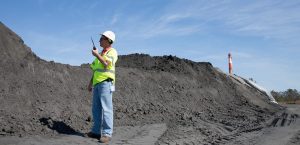
The environmental activist group Earthjustice indicates it will file a lawsuit to stop EPA Administrator Scott Pruitt from transferring oversight of coal ash contamination to Oklahoma.
“If anyone believes this decision will protect Oklahoma’s residents from coal ash pollution, than I have some oceanfront property in the state to sell you,” wrote Jennifer Cassel, an attorney with Earthjustice. “Oklahoma’s Department of Environmental Quality made clear that it wanted state rules precisely to protect industry from public oversight.”
The most significant coal ash problem is in the southeast town of Bokoshe located close to a coal-fired power plant. For years, residents have complained of high rates of cancer they believe was caused by the coal ash. But last year, the Oklahoma Department of Health carried out a study and found there was no elevated cancer rate in Bokoshe.
Earthjustice attorney Cassel disagrees.
“Pruitt knows full well that the only thing that will happen is for the toxic contamination from coal ash to get worse. Already the coal-fired power plants are violating state and federal rules on coal ash. And yet Pruitt has approved a program that keeps coal ash management behind closed doors and allows his polluter buddies to self-regulate, leaving the fox guarding the henhouse,” she wrote.
The organization released a report this week claiming to have found contamination of groundwater near coal ash sites in Oklahoma.
Earthjustice claimed the following coal ash pollutants were found in groundwater at coal ash dumps at these four Oklahoma sites:
- American Electric Power’s Northeastern coal plant in Oologah — Boron, Cobalt, Lithium, Molybdenum, Radium, Selenium and Sulfate
- Grand River Dam Authority’s Grand River Energy Center coal plant near Choteau — Arsenic and Sulfate
- Western Farmers’ Electric Cooperative’s Hugo coal plant in Choctaw County — Boron, Lithium, Molybdenum, Sulfate, Radium and Thallium
- The Big Fork Ranch coal ash landfill in Noble County — Boron and Sulfate
“A takeover by Oklahoma means that a bad situation will get a lot worse,” said Lisa Evans, a former EPA official who is an attorney at Earthjustice and one of the country’s leading experts on coal ash pollution. “States are beginning to line up at Scott Pruitt’s door to shield their toxic coal ash dumps from public health protections. Oklahoma is likely the first domino to fall in a series of states. Oklahoma is an example of how not to handle coal ash pollution.”
“It’s like asking for a promotion after you have failed every performance review you have ever taken,” said Johnson Grimm-Bridgwater, Director of the Oklahoma Chapter of Sierra Club who testified at the EPA’s hearing on coal ash pollution. “The test results are staggering. The serious water contamination from coal plants that happened right under the State of Oklahoma’s nose is proof that they are not willing to protect their residents from toxic coal ash pollution. Sadly, we have 54 lakes in Oklahoma officially polluted and posted as contaminated with mercury — a direct result of the byproducts of burning coal in our state. Not to mention the poor citizens of Bokoshe, Oklahoma, who can attest to how their waters have been polluted by coal ash.”
“This rampant toxic pollution is proof that state officials are not holding coal plant operators accountable to the people of Oklahoma. These coal plant operators are flouting the state and federal rules, and the politicians are letting them get away with it,” said Earl Hatley, Grand Riverkeeper and LEAD Agency, Inc., who testified at Oklahoma’s hearing against their inadequate state plan, as well as at an EPA hearing near Washington, D.C., on federal coal ash rules.
If approved by Scott Pruitt and the EPA, Oklahoma’s rules would allow coal ash landfills and impoundments (ponds) to have permits that last “for life,” meaning they will not be revisited periodically to ensure they are not endangering nearby communities or the environment. In contrast, permits for hazardous waste landfills, air pollution, and wastewater discharges must be renewed at regular intervals — and for good reason. Moreover, under the state’s program, many key decisions about how coal ash dumps are operated would be made behind closed doors, depriving the public of the opportunity to weigh in on whether operators are doing enough to protect Oklahoma communities and waters.






